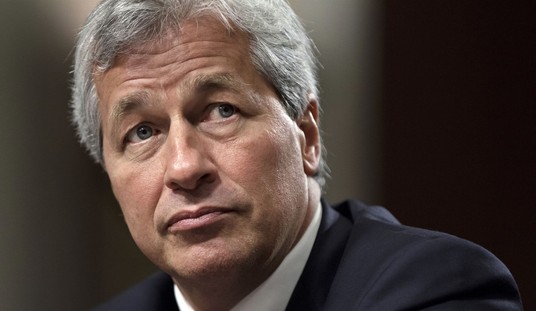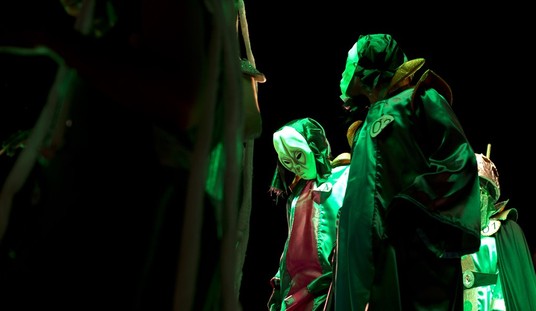
President Donald Trump speaks about Iran from the Diplomatic Reception Room at the White House in Washington, Friday, Oct. 13, 2017. Trump says Iran is not living up to the “spirit” of the nuclear deal that it signed in 2015, and announced a new strategy in the speech. He says the administration will impose additional sanctions on the regime to block its financing of terrorism. (AP Photo/Evan Vucci)
Minutes ago, President Trump gave an address in which he said he would not certify the Iran nuclear deal as being in the best national security interests of the United States but stopped short of walking from the deal. This was expected and has been expected for over a month. (Read Sarah Lee’s preview of the speech.)
The Speech
President Trump declared Friday that the Iran nuclear deal is no longer in the national security interest of the United States, but stopped short of withdrawing from the Obama-era pact.
“I am announcing today that we cannot and will not make this certification,” Trump said during a speech at the White House.
“We will not continue down a path whose predictable conclusion is more violence, more terror and the very real threat of Iran’s nuclear breakout.”
The president said that Iran has “has committed multiple violations of the agreement” and accused Terhan of “not living up to the spirit of the deal.”
Trump ticked off a list of problems with the deal and laid out a new, tougher strategy to confront “the rogue regime” over a series of other “hostile actions” unrelated to its nuclear program.
Let’s stop here for a second.
As part of the deal, Iran agreed to abide by “related agreements.” One of those was UN Security Council Resolution 2231 which requires Iran to abandon development of ballistic missiles. The IAEA, the agency charged with validating Iran’s compliance, has said it cannot verify that Iran is, in fact, obeying the agreement. In addition, the IAEA cannot inspect nuclear sites managed by the Iranian military.
We do not have a “pact” with Iran. The deal was never submitted to the Senate for ratification as a treaty. The Obama State Department said it was not an executive agreement but only a political agreement between the Obama administration and Iran.
The New York Times:
President Trump on Friday made good on a long-running threat to disavow the Iran nuclear deal that was negotiated by his predecessor, Barack Obama. But he stopped short of unraveling the accord or even rewriting it, as the deal’s defenders had once feared.
In a speech that mixed searing criticism of Iran with more measured action, Mr. Trump declared his intention not to certify Iran’s compliance with the agreement. Doing so essentially kicks to Congress a decision about whether to reimpose sanctions on Iran, which would blow up the agreement.
“We will not continue down a path whose inevitable result is more violence, more chaos and Iran’s nuclear breakout,” Mr. Trump declared at the White House, as he laid out a broader strategy for confronting Iran.
The president derided the deal as “one of the worst and most one-sided transaction the United States has ever entered into.” But he added, “What’s done is done, and that’s why we are where we are.”
President Trump on Friday officially disavowed the international nuclear deal with Iran, but did not terminate an agreement he called weak and poorly constructed.
Instead, the president asked Congress to attach new caveats that could either alter the pact or lead to its rupture.
“We will not continue down the path whose predictable conclusion is more violence, more terror and the very real threat of Iran’s nuclear breakout,” Trump said in remarks delivered at the White House.
His decision to withdraw “certification” of the deal throws its future into doubt but does not break it outright. It is now up to Congress to draft new requirements that address Trump’s concerns. If that fails, Trump threatened to unilaterally withdraw.
Trump made clear he has not changed his low opinion of the deal itself and he detailed his dissatisfaction with what he sees as gaps and failures in the agreement within a larger reframing of U.S. policy toward Iran.
“As I have said many times, the Iran deal was one of the worst and most one-sided transactions the United States has ever entered into,” he said, later charging that Tehran is “not living up to the spirit of the deal.”
The Way Forward
Now the Congress has sixty days in which to decide to reimpose sanctions, which will spell the end of the deal, or pass new legislation containing new milestones. I suspect neither will happen because that putrescent bag of guts, Bob Corker, is in charge of making it happen.
Bob Corker had just unveiled legislation to "address flaws in Iran nuclear deal". pic.twitter.com/juN7v5Eh1a
— Kyle Griffin (@kylegriffin1) October 13, 2017
I have to admit getting a great deal of pleasure out of seeing Trump sticking it to Corker with this. Corker had an opportunity to tell Obama that he could either come to the Senate with a treaty or he could take a hike. But Corker, every the practitioner of Failure Theater, wanted to act as though he was some sort of Foreign Policy Maven and concocted this abortion of a law that gave Obama cover by making the Senate part of the deal without having any input to the deal or even access to reading what the deal contained. Often we’ve found out the contents of the side deals from the Iranians.
We don’t know yet what these benchmarks will look like but the main stumbling block will be that Trump and Congress agree that the restrictions on Iran developing nuclear weapons is permanent and the Iranians do not agree. The speech gives an idea of what else is happening:
We will not continue down a path whose predictable conclusion is more violence, more terror, and the very real threat of Iran’s nuclear breakout.
That is why I am directing my administration to work closely with Congress and our allies to address the deal’s many serious flaws so that the Iranian regime can never threaten the world with nuclear weapons. These include the deal’s sunset clauses that, in just a few years, will eliminate key restrictions on Iran’s nuclear program.
The flaws in the deal also include insufficient enforcement and near total silence on Iran’s missile programs. Congress has already begun the work to address these problems. Key House and Senate leaders are drafting legislation that would amend the Iran Nuclear Agreement Review Act to strengthen enforcement, prevent Iran from developing an inter- — this is so totally important — an intercontinental ballistic missile, and make all restrictions on Iran’s nuclear activity permanent under U.S. law. So important. I support these initiatives.
The Islamic Revolutionary Guard Corps (IRGC) was hit with sanctions related to its terrorist activities. The administration, however, did not label the IRGC as a designated Foreign Terrorist Organization. This is a solid move as designating the IRGC as a FTO would probably have created an immediate reaction directed against our troops in Syria. However, it is difficult to see how the FTO designation does not happen in the next several months.
This is a great discussion of what this means:
And this
https://twitter.com/alikhedery/status/918897306845548544
https://twitter.com/alikhedery/status/918899861583552512
The Reactions
https://twitter.com/zaidbenjamin/status/918890831037255680
.@IsraeliPM statement about @POTUS speech on Iran.https://t.co/kD1IqPMEqj
— Amb. Ron Dermer (@AmbDermer) October 13, 2017
EU's foreign policy chief Federica Mogherini says "it's not up to any single country to terminate" Iran nuclear deal https://t.co/j0p9OGpgAe
— BBC Breaking News (@BBCBreaking) October 13, 2017
Russia just slammed Trump over the Iran deal https://t.co/gCDZRXpXfL pic.twitter.com/8F4J14EcR5
— The Independent (@Independent) October 13, 2017
And this:
The Latest: Iranian President Hassan Rouhani says his country "will continue to stick to" the nuclear deal. https://t.co/wFZ5Hm0JZu
— The Associated Press (@AP) October 13, 2017
#BREAKING: Iranian president Hassan Rouhani has spoken to told France's Macron on the phone & said Tehran will not renegotiate #IranDeal https://t.co/S1zPHDywYa
— Anna Ahronheim (@AAhronheim) October 13, 2017
Significance
Today’s decision marks a major departure from the policy of the Obama administration which was that Iran could be appeased and eventually tamed and made into a US ally. This was a stupid concept that ignored 40 years of Iranian behavior but, then again, a lot of stupid people came up with the idea. Focusing on Iran’s spread of terrorism serves to strengthen the Arab bulwark the Trump administration has been building to contain Iranian expansionism.
Bottom Line
As Sarah Lee quoted Secretary of State Rex Tillerson in her post:
Tillerson was firm in his assertion that the U.S. will never allow Iran to have nuclear weapons, and the belief is that amending the INARA legislation is one potential way of fulfilling that promise.
“The best platform is to attempt to fix this deal,” Tillerson said, pointing out that Obama’s Iran deal will not be affected by any amendment to the INARA. “We may not be able to fix it,” he added.
Answering a question from a reporter, who relayed a criticism that some believe that if the Trump administration walks away from the Iran deal other nations would never be able to trust the U.S. again, Tillerson said, “I think they can trust we’ll never do a deal this weak again.”
And Trump was clear in the speech that he’s willing to walk away from the table:
However, in the event we are not able to reach a solution working with Congress and our allies, then the agreement will be terminated. It is under continuous review, and our participation can be cancelled by me, as President, at any time.
The US is insisting upon conditions that Tehran will not agree to. It is inevitable that Tehran either decides to leave the agreement or they violate the benchmarks the Congress will set. The sooner this happens the better because this deal does nothing good for the United States.












Join the conversation as a VIP Member